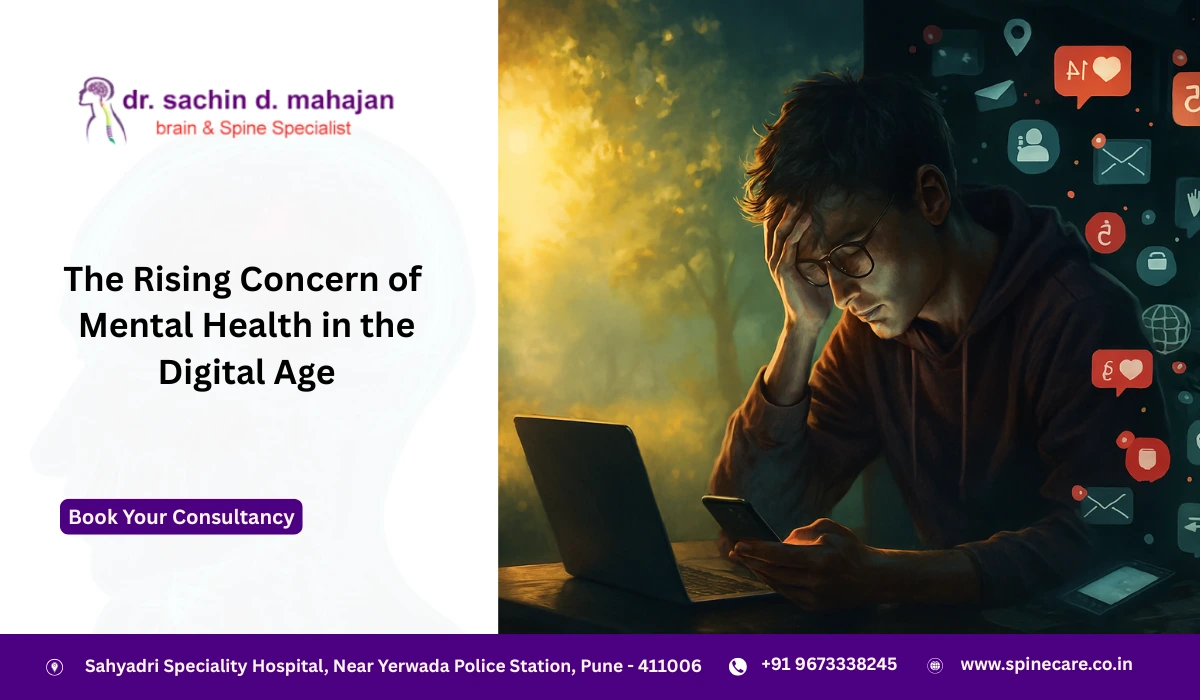
The Rising Concern of Mental Health in the Digital Age
In today’s fast-paced, hyperconnected world, our lives revolve around screens. From social media to smartphones and work emails, technology influences nearly every aspect of our daily routine. While it has made communication easier and access to information faster, the digital age has also brought a silent epidemic — the rising concern of mental health issues.
This blog explores how the digital world affects our minds, why mental health problems are increasing, and what steps individuals can take to find balance between technology and well-being.
1. Why Is Mental Health Becoming a Major Concern in the Digital Age?
With the advent of smartphones, social media platforms, and round-the-clock digital access, people are more connected — yet more isolated than ever. Constant exposure to online content, unrealistic standards, and digital pressure has led to increasing cases of anxiety, depression, and stress-related disorders.
Key reasons include:
- Information overload causing cognitive fatigue.
- Social comparison leading to low self-esteem.
- Sleep disruption from excessive screen time.
- Reduced real-world interaction, increasing loneliness.
As a result, even young adults and teenagers face mental health challenges at unprecedented levels.
2. How Does Social Media Impact Mental Health?
Social media is a double-edged sword. It helps people stay connected and informed but also contributes to emotional distress.
Negative Impacts:
- Comparison culture: Constant exposure to idealized lifestyles triggers self-doubt and inadequacy.
- Cyberbullying: Online harassment leads to trauma and social anxiety.
- Fear of Missing Out (FOMO): Creates compulsive scrolling and dissatisfaction.
- Addiction: Dopamine-driven engagement traps users in endless digital loops.
Positive Aspects:
- Support communities: Online therapy groups and mental health forums can offer genuine help.
- Awareness: Social media helps spread knowledge about mental health conditions and self-care.
Balancing screen time and curating healthy online habits are key to maintaining mental well-being.
3. What Are the Common Mental Health Issues in the Digital Era?
The digital lifestyle has introduced new psychological conditions while worsening existing ones.
Most common digital-age mental health problems include:
- Anxiety Disorders: Triggered by constant notifications, social pressure, and online judgment.
- Depression: Linked to digital isolation and exposure to negative content.
- Sleep Disorders: Blue light disrupts melatonin levels, reducing sleep quality.
- Tech Addiction: Inability to stay offline or take digital breaks.
- Digital Burnout: Emotional exhaustion caused by overuse of screens.
At Spine Care Pune, we recognize that mental health and neurological health are deeply connected — prolonged stress and anxiety can even contribute to chronic pain, headaches, and spine tension.
4. How Does Constant Connectivity Affect the Brain?
The human brain isn’t designed for continuous stimulation. In the digital age, people switch attention between apps, emails, and alerts every few seconds. This behavior leads to:
- Reduced attention span
- Memory lapses
- Decision fatigue
- Decreased emotional regulation
Studies show that excessive digital multitasking activates the brain’s stress response, increasing cortisol levels. Over time, this can affect brain structure and lead to anxiety and irritability.
5. What Is Digital Detox and Why Is It Important?
A digital detox means intentionally taking breaks from devices to recharge mentally and emotionally.
Benefits include:
- Restored focus and productivity
- Better sleep quality
- Improved real-world relationships
- Reduced anxiety and eye strain
You can start small — no-phone hours, screen-free Sundays, or using “focus mode” during work hours. Over time, digital detoxing helps build a healthier relationship with technology.
6. How Does Technology Affect Children and Teenagers Mentally?
Children and teens are among the most vulnerable groups in the digital era. Excessive screen time and exposure to online content can impact their developing brains.
Effects include:
- Reduced concentration and academic performance
- Social withdrawal and isolation
- Poor body image and self-esteem
- Increased irritability and mood swings
Parents should monitor screen usage, encourage outdoor activities, and promote open communication about digital experiences.
7. Can Too Much Screen Time Cause Physical Health Problems Too?
Absolutely. Mental and physical health are interconnected. Prolonged screen time often leads to:
- Eye strain (Digital Eye Syndrome)
- Neck and spine problems (Tech Neck)
- Poor posture
- Headaches and fatigue
Regular stretching, maintaining proper ergonomics, and scheduling screen breaks can help prevent these issues.
8. How Can Working Professionals Protect Their Mental Health in the Digital Workplace?
Remote work and digital communication tools have blurred work-life boundaries. To maintain balance:
- Set clear work hours and avoid after-hour emails.
- Take micro-breaks every hour.
- Use productivity tools to manage tasks efficiently.
- Disconnect during meals and rest time.
- Engage in physical activities to offset sedentary behavior.
Mental well-being at work directly influences creativity, performance, and job satisfaction.
9. How Can You Identify Signs of Digital Burnout?
Digital burnout occurs when constant exposure to screens drains mental energy.
Common signs include:
- Feeling overwhelmed or irritable
- Reduced motivation
- Difficulty focusing
- Sleep disturbances
- Emotional numbness
If you experience these symptoms, step back from digital devices and engage in restorative activities like reading, exercising, or meditation.
10. What Are the Best Ways to Maintain Good Mental Health in the Digital Age?
Here are practical, science-backed tips to stay mentally healthy in the digital era:
Set Screen Time Limits: Use apps that track daily usage.
Prioritize Real-Life Connections: Meet friends and family offline.
Mindful Consumption: Follow uplifting, informative content only.
Exercise Regularly: Boosts endorphins and reduces stress.
Practice Mindfulness or Meditation: Calms the mind and improves focus.
Get Enough Sleep: Keep devices away an hour before bedtime.
Seek Professional Help: If digital habits cause distress, consult a psychologist or neurologist.
11. How Are Mental Health and Neurological Health Connected?
Mental and neurological health are deeply intertwined. Chronic anxiety and stress can cause physical symptoms like headaches, back pain, or muscle tension — issues often treated at Spinecare Best Spine Surgeon pune.
When stress hormones remain high, they can affect the nervous system, leading to:
- Insomnia
- Fatigue
- Reduced immune function
- Chronic pain
That’s why a holistic approach — addressing both mind and body — is essential for true healing.
12. When Should You Seek Professional Help?
If you notice prolonged sadness, anxiety, irritability, or loss of interest in daily activities, it’s important to consult a mental health or neurological specialist.
Early intervention can prevent symptoms from worsening. At Spinecare Best Neurosurgeon in Pune, our experts assess both psychological and neurological factors to provide integrated, personalized treatment.
13. How Can Society Promote Better Mental Health Awareness?
Building a mentally healthy society starts with awareness and empathy. Steps include:
- Encouraging open discussions about mental well-being.
- Introducing mental health education in schools and workplaces.
- Reducing stigma around therapy and counseling.
- Supporting community-based programs for stress management and mindfulness.
By normalizing mental health care, we empower individuals to seek help without fear or shame.
Conclusion
The digital age has revolutionized communication and convenience — but it also demands balance and self-awareness. The rising concern of mental health in the digital age reminds us to pause, reflect, and nurture our mental well-being.
Technology should serve us — not control us. With mindful usage, digital detoxing, and professional support when needed, it’s possible to thrive mentally, emotionally, and physically in today’s connected world.
At SpineCare, we believe in holistic healing — caring for both the mind and the body. If stress, anxiety, or digital fatigue are affecting your daily life, consult our experts for comprehensive mental and neurological health guidance
Read Here : Which Hospital is Best for Neurology in Pune?




